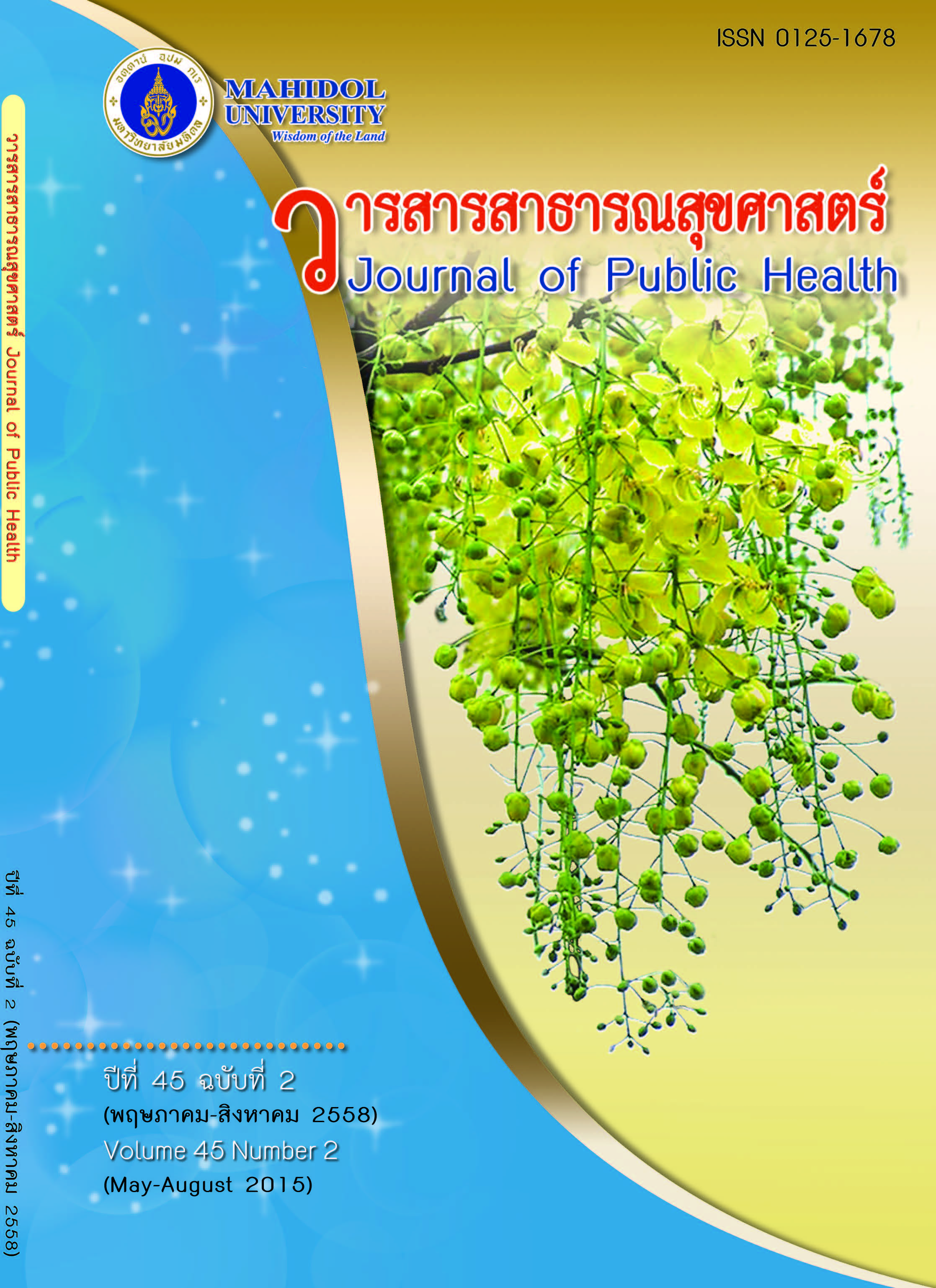ปัจจัยทำนายความตั้งใจไม่ดื่มสุราของนักศึกษาระดับปริญญาตรีในมหาวิทยาลัยแห่งหนึ่งทางภาคใต้ของประเทศไทย
Keywords:
ทฤษฎีพฤติกรรมตามแผน, ความตั้งใจไม่ดื่มสุรา, นักศึกษาปี 1, theory of planed behavior, intention to non- drinking, first-year studentsAbstract
บทคัดย่อ
การดื่มสุราในนักศึกษาระดับมหาวิทยาลัยเป็นปัญหาพฤติกรรมเสี่ยงด้านสุขภาพที่สำคัญปัญหาหนึ่ง การวิจัยนี้มีวัตถุประสงค์เพื่อ ศึกษาปัจจัยทำนายความตั้งใจไม่ดื่มสุราในอีก 6 เดือนข้างหน้า กลุ่มตัวอย่างคือนักศึกษาชั้นปีที่ 1 จำนวน 203 คน ใช้ทฤษฎีพฤติกรรมตามแผนของ ไอเซ็น (1991) เป็นกรอบแนวคิดในการวิจัย และพัฒนาเครื่องมือ เครื่องมือวิจัย ประกอบด้วย แบบบันทึกข้อมูลส่วนตัว แบบสอบถามเจตคติต่อการไม่ดื่มสุรา การคล้อยตามกลุ่มอ้างอิงเกี่ยวกับการไม่ดื่มสุรา การรับรู้การควบคุมพฤติกรรมการไม่ดื่มสุรา และความตั้งใจไม่ดื่มสุรา วิเคราะห์ข้อมูลด้วยสถิติเชิงบรรยาย และการวิเคราะห์ถดถอยพหุคูณแบบเชิงชั้น ผลการศึกษาพบว่า กลุ่มตัวอย่างอายุเฉลี่ย 19.83 ปี ส่วนใหญ่เป็นเพศหญิง (ร้อยละ70) มีประวัติเคยดื่มสุราร้อยละ 48.9 และพบว่า การรับรู้การควบคุมพฤติกรรม เจตคติ และพฤติกรรมดื่มสุราในอดีต การคล้อยตามกลุ่มอ้างอิง สามารถร่วมกันทำนายความตั้งใจไม่ดื่มสุราของนักศึกษาได้ ร้อยละ 59.6 (R2 = .596, p = .001) ข้อเสนอแนะจากการศึกษาครั้งนี้ การวางแผนป้องกันการดื่มสุราในนักศึกษาปีที่ 1 มหาวิทยาลัยควร ส่งเสริมให้นักศึกษามีความตั้งใจไม่ดื่มสุรา ส่งเสริมความเชื่อมั่นในการควบคุมตนเองที่จะไม่ดื่มสุราไม่ว่าจะอยู่ในสถานการณ์ใดๆ มีเจตคติด้านบวกต่อการไม่ดื่มสุรา และเพิ่มกลยุทธ์ในการหยุดดื่มสำหรับนักศึกษาที่เคยดื่มสุราก่อนเข้าศึกษาในมหาวิทยาลัย
Factors Predicting intention to Non-drinking among Undergraduate Students from One University in Southern Thailand
ABSTRACT
Drinking in undergraduate student is a major health risk behavior problem. The purpose of this research is to study factors predicting intention to non-drinking in 6 months ahead. Subject were 203 first-year students . The theory of planned behavior by Ajzen (1991) was used as the conceptual framework of this study and used to develop the research instruments. The research instruments were a personal information form, attitudes toward non-drinking, subjective norms toward non-drinking, perceived control of non-drinking, and intention to non-drinking. The data were analyzed with descriptive statistics, and hierarchical multiple regression analysis. The results: The samples mean age of 19.83 years, the majority were female (70%), 48.9% had a history used alcohol. The results of multiple regression analysis showed the perceived behavior control, attitude, drinking behavior in the past and subjective norms can explain 59.6% (R2= .596, p< .001) of the variance in intention to non-drinking. The suggestion of this study for prevention of drinking alcohol in the first-year. The University should encourage the student intends to non-drinking. Promote confidence in the self-control to not drink alcohol in any circumstances. A positive attitude toward non-drinking. And adding strategy to stop drinking in the students who used to drink alcohol before studying in University.
Downloads
Issue
Section
License
Creative Commons License CC-BY-ND


